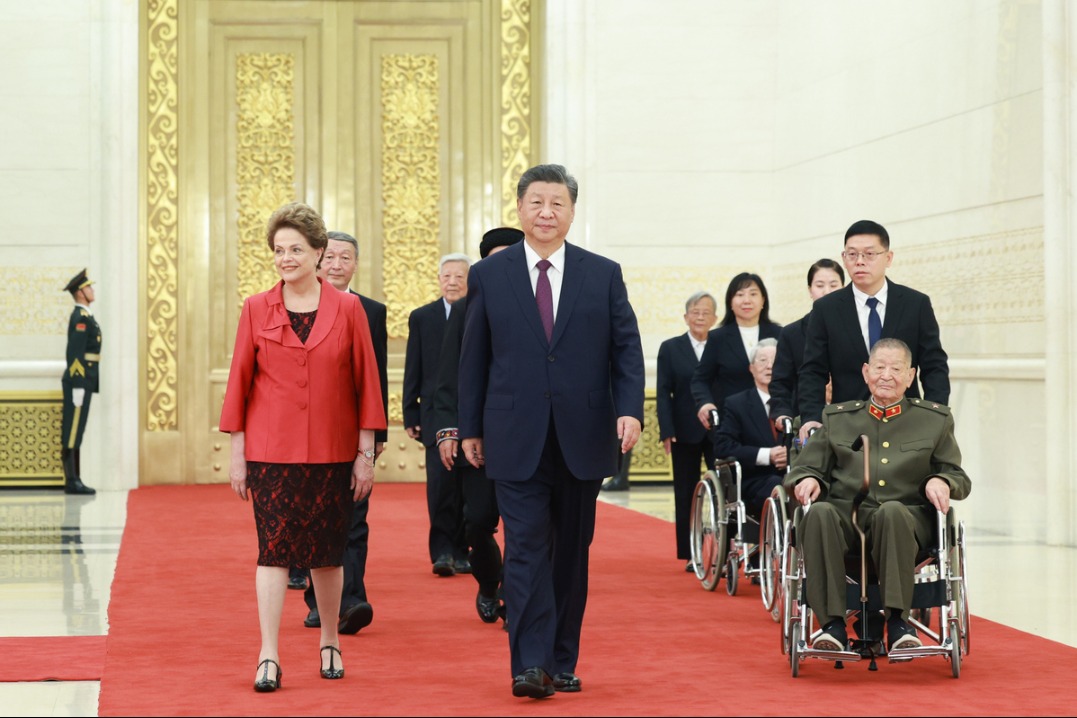France toughens language requirements for migrants
By MOHAMMAD ARIF ULLAH For China Daily in Paris | China Daily Global | Updated: 2024-02-08 10:00

France has implemented a new immigration law aimed at migrants, with strict language requirements purportedly aimed at promoting national unity and integration.
The controversial bill was passed by the National Assembly on Dec 19 and later approved by the Constitutional Council on Jan 25, with some articles rejected.
Despite the rejection of some measures related to social benefits and family reunification, the court upheld the tough language requirements and introduced civic tests for migrants.
France's President Emmanuel Macron approved the bill, which was published in France's official journal on Jan 26.
Following the court's decision, Jordan Bardella, president of the far-right RN party, told BFM TV his party believes the Constitutional Council rejected parts of the immigration bill that were "widely supported by the French people".
Macron said on TV channel France 5's show C a vous on Dec 20 that the proposed law would "address migration fl ows, tackle illegal immigration, and enhance integration through language education and employment opportunities".
Former labor minister Olivier Dussopt asserted during an appearance on the French TV channel CNEWS: "The most effective approach to integrating non-EU foreigners is through language acquisition and employment."
But critics say the law marks a significant shift in the country's approach to immigration and citizenship by mandating that all foreigners applying for a residence document must sign a commitment contract affirming loyalty to the principles of the French Republic. They must also pass a civics test, alongside a language proficiency exam if they want a multi-annual residence permit.
According to the French Office for the Protection of Refugees and Stateless Persons, almost 142,500 asylum applications were lodged in France in 2023.
Marie-Caroline Saglio-Yatzimirsky, a professor of anthropology at Inalco University Paris and director of the French Collaborative Institute on Migration, or CI Migration, said the strict language requirements create inequalities among applicants seeking longterm residency based on their French proficiency, access to information, literacy levels, and financial resources. Additionally, she highlighted challenges in implementing the law, such as in assessing proficiency levels, providing nationwide training, and dealing with capacity issues.
Citizenship barrier
Migrants seeking a multi-year residency card will require an A2 level in French, according to the international DELF standard.While those applying for a permanent residence permit must achieve proficiency at level B1.
Marianne Bel, a representative from the French NGO La Cimade, said she was concerned about the requirements.
"This law is entirely discriminatory, creating a divide between French-speaking and non-Frenchspeaking migrants," she said."The level of French proficiency required in the new law is excessively high."
People who aim to achieve citizenship through their residency in France will now need a B2 level of proficiency in French, instead of the B1 level that was previously requested. The shift, the government said, is to ensure migrants have the necessary language skills to integrate effectively into French society.
But Bel said:"The government's aim is to lower the number of people becoming French citizens. If we look at the figures from the past three years, it's clear to see."
Saglio-Yatzimirsky added: "The B2 level is very advanced and mainly used in academic settings. Language should help with integration, but the new immigration bill doesn't support this. For instance, migrants from places like Afghanistan or China who aren't familiar with Latin words and the alphabet will find it very difficult to learn.French is known to be a challenging language to master."
Under the new law, employers are also called upon to contribute to language training, as part of vocational training offered to migrant employees. This includes offering French language courses during working hours, either as part of the employer's training plan or through the French Office of Immigration and Integration.
Saglio-Yatzimirsky said: "We don't know how all employers will arrange it with their employees.Maybe some of them will make it but for most of them, it will be very difficult … The new restrictions will cause serious discrimination against the migrants living in big cities like Paris and Lyon and the migrants living in small cities and rural areas, where there are not enough structures to learn French."
The French government said when it introduced the law, it will facilitate linguistic integration within the workplace and support migrants in developing essential language skills. But, in an article in a CI Migration publication, Daniele Lochak, a lawyer and former president of the Paris-based NGO GISTI, said the "new requirement for French proficiency is aimed at sorting, rather than integration".
Bel added: "Making it obligatory to have a specific certificate to renew or get a new residence permit is absolutely a decision against migrants."
She said "some of them already came here by passing a difficult migration route", and the language requirements will add another layer of difficulty.
























